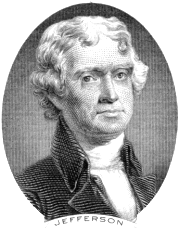
[W]e're all liberals, because it's a liberal Constitution. Thomas Jefferson was probably the greatest of all liberals, and he was considered a leftist at that time.

[W]e're all liberals, because it's a liberal Constitution. Thomas Jefferson was probably the greatest of all liberals, and he was considered a leftist at that time.
Who's best for America?
Responding to Gloria Steinem's message (Fall 2000) that Democrats should reject Ralph Nader and elect Al Gore, Matthew B. wrote:
>> If it were up to me I would have Harry Browne be the president, but American's aren't educated enough for that either. <<
I'd say Americans are educated enough to reject Browne and the Libertarian Party. They need only look at any free-market debacle—for instance, California's power deregulation—to see a mixture of business and government works best. That's why they consistently vote against unproven libertarian schemes such as vouchers and for tax funds for public schools.
>> As we know politics in America has and does change, maybe in four more years we can have real change. <<
Yes, we can elect someone left-of-center again after George W. tilts America to the right.
>> No matter who wins, we the people are going to have to continue to educate ourselves and do more to change the direction we seem to be heading. <<
Which direction is that? Broadly speaking, America is moving slowly toward more freedom in social areas and more responsibility in economic areas. That direction doesn't require any change because it's the right direction.
>> Have you studied the formation of America? Have you read the info on our founding fathers? <<
Not only have I read it, but I've posted some of it on my site. The question is whether you've read anything about the Founding Fathers. The most common misconception is that they were all like-minded libertarian types, which is ridiculous to anyone who's cracked a history book.
The reality is that about half the Founding Fathers—the ones who became Federalists—favored a strong federal government. That's why they called themselves Federalist. Hamilton, the leading Federalist thinker and the main writer of the Federalist Papers, had this to say about the "limits" of government:
[T]he federal government must of necessity be invested with an unqualified power of taxation in the ordinary modes.
Hamilton, Federalist No. 31
Oops. You did know the whole idea of checks and balances came about because many Founders favored a strong central government, didn't you? Maybe you should educate yourself before you worry about my education.
Others second this reading of the Founding Fathers. For instance, consider this excerpt from Richard Brookhiser's review of Alexander Hamilton by Ron Chernow. In the LA Times, 4/25/04:
Hamilton looked beyond his department to advise Washington on the entire conduct of the government. Hamilton argued for "energy in the executive." He wanted the government, led by the president, to do whatever needed doing as long as it was not explicitly forbidden. This advice brought him into conflict with his former co-author Madison, who had once seemed to agree with it but now got cold feet. Their quarrel over constitutional interpretation helped generate the first two-party system — Hamilton's Federalists versus Jefferson and Madison's Republicans (ancestors of today's Democrats, not the GOP). When Jefferson and then Madison became president, they both to a great extent followed Hamilton's advice, without ever admitting it.
So Hamilton's party favored a strong central government. Jefferson's party opposed it in theory but accepted it in reality. Sounds to me like Hamilton's position was the predominant one.
Garry Wills, a leading political writer, confirms my point in his book A Necessary Evil: A History of American Distrust of Government. From a book review in the LA Times, 10/3/99:
Wills' main point is clear and persuasive. The Constitution was created by men who wanted to strengthen national authority, not weaken it, and who believed state governments were more likely than the national to abuse power and threaten individual liberties. Yet somehow, the Anti-Federalist critique of the Constitution, which warned of the danger to liberty posed by overweening federal authority, became the common understanding of what the founders had wrought.
In short, the idea that Jefferson represented the Founders is a myth. In fact, he represented the opposition to what most Founders sought.
What the Founders intended
>> Do you think the federal government is even close to what most of the founding fathers would have wanted it to be? <<
Given Jefferson's Louisiana Purchase, which may be the biggest US government action of all time (by some measure), I think the Founders understood that government can't ignore reality. I think they'd understand that government had to grow to keep pace with the country's population, now 281 million. That's why they included broad phrases such as "provide for the general welfare" as well as the power to add amendments.
>> Have you read the constitution and the bill of rights? <<
You've got to be kidding me. I won the award for best student in Western Civilization (history) at one of the top three high schools in Southern California. A better question is whether you were alive when I read it the first time, some 30 years ago. I'm guessing not.
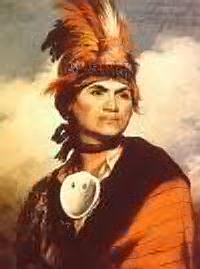
I know enough about the US Constitution to know it was partly modeled on the Iroquois League's style of government. Did you know that? The details are at Fun 4th of July Facts. It's one of many times I discuss the Constitution on my site.
>> Do you think the federal government has overstepped its power at all? <<
Not really. The Constitution has many clauses that are subject to interpretation. Our leaders have rightly interpreted them.
Which is not to say that everything government does is good—far from it. But a government act that's bad because it doesn't work is different from a government act that's "bad" because it violates some arbitrary rule. And the rules are arbitrary, as the present Supreme Court majority has proved so well. They favor states' rights and "strict construction," except when these principles get in the way of their decisions.
Beginning Matthew's education...
Responding to a message titled "Founding fathers = libertarian? NOT," Matthew tried to convince me of his position by quoting Thomas Jefferson. Matthew's (and Tom's) comments continue in italics:
The following can be found in "Thomas Jefferson: Writings," The Library of America, Copyright 1984, ISBN 0-94-450-16-x. This book has everything know to have been written by Jefferson.
I went to the back of the book and looked up states rights, following are a few things I found. I trust you will find them interesting.
Page 74, from his Autobiography:
...Were not this great country already divided into states, that division must be made, that each might do for itself what concerns itself directly, and what it can so much better do than a distant authority. Every state again is divided into counties, each to take care of what lies within its local bounds; each country again into townships or wards, to manage minuter details; and every wad into farms, to be governed each by its individual proprietor.
No one's arguing against the federal/state division of power. Ideally, the state should do what concerns it directly and the federal government should do what concerns it directly. This quote doesn't tell us anything we didn't already know.
Were we directed from Washington when to sow, & when to rap, we should soon want bread.
I didn't know rapping was among Jefferson's many talents. <g>
This is Jefferson's opinion about what he considered best, not a statement about what is or isn't constitutional.
Page 416, Opinion on the Constitutionality of a National Bank:
...I consider the foundation of the Constitution as laid on this ground: That "all powers not delegated to the United States, by the Constitution, nor prohibited by it to the States, are reserved to the States or to the people." [XIIth amendment.]
That's the 10th Amendment, not the 12th. If the powers are reserved to the people, the people have the right to delegate them back to the state or federal governments. This clause really doesn't limit the Constitution the way you think it does. Sorry to burst your bubble.
9th Amendment bolsters 10th
By saying "the enumeration in the Constitution, of certain rights, shall not be construed to deny or disparage others retained by the people," the 9th Amendment reinforces this interpretation of the 10th Amendment. The people have more rights than those listed in the Constitution. Do those include the right to privacy? Yes. The right to abortion? Yes. The right to an expansive interpretation of the Constitution? Yes.
Just as people can grant themselves rights in state constitutions that go beyond the US Constitution, they can extend the Constitution using its broad or ambiguous provisions. Even James Madison, almost as strict a constructionist as Jefferson, said the people had the right to change their view of the government's power:
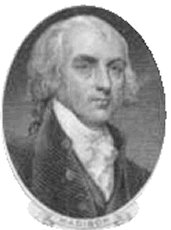
If, therefore, as has been elsewhere remarked, the people should in future become more partial to the federal than to the State governments, the change can only result from such manifest and irresistible proofs of a better administration as will overcome all their antecedent propensities. And in that case, the people ought not surely to be precluded from giving most of their confidence where they may discover it to be most due....
James Madison, Federalist No. 46
I consider this a nice restatement of the 9th and 10th amendments. It implies the people's rights supersede any hazy interpretation of the Constitution's limits. Unless the Constitution is definite on a point—e.g., the president's term shall be four years—the people's view of their own rights is paramount. If they say the right to privacy or abortion is one of their unenumerated rights per the 9th Amendment or one of their reserved rights per the 10th Amendment, it is—by definition.
The same applies to flag-burning, school prayer, or homosexual marriages. Since the Constitution isn't explicit on these issues, the "right" is whatever the American people say it is. If the people elect a Congress that passes a law that the president signs and the Supreme Court upholds, that becomes the definition of our rights—not what Jefferson thought our rights were 225 years ago. The people have unenumerated and reserved rights Jefferson never imagined.
To take a single step beyond the boundaries thus specially drawn around the powers of Congress, is to take possession of a boundless field of power, no longer susceptible of any definition.
Again, an opinion about what's best, not a proclamation of what's constitutional.
The incorporation of a bank, and the powers assumed by this bill, have not, in my opinion, been delegated to the United States, by the Constitution....
Clearly George Washington, Alexander Hamilton, and other Federalists believed differently, since they championed the bank's creation. Apparently the Founding Fathers weren't uniformly libertarian, as I've said.
Fiscal powers are broad
Here's one of Hamilton's statements about the federal government's powers:
A complete power, therefore, to procure a regular and adequate supply of revenue, as far as the resources of the community will permit, may be regarded as an indispensable ingredient in every constitution.
Alexander Hamilton, Federalist No. 30
Even Jefferson wasn't as libertarian as his rhetoric might suggest. For instance:
He regarded himself as more loyal to the U. S. Constitution than his loose-constructionist foes were, though in fact he was less a strict constructionist in practice than in theory. Although he had objected to features of Hamilton's financial system, he had no intention of upsetting it now that it was firmly established.
Encyclopedia Americana
Page 1493, Letter to Major John Cartwright Monticello, June 5th, 1824:
To the State governments are reserved all legislation and administration, in affairs which concern their own citizens only, and to the federal government is given whatever concerns foreigners, or the citizens of the other States; these functions alone being made federal.
Yes...so? Most federal laws concern the citizens of all states, not the citizens of one state only. Besides, the 14th Amendment, among others, enlarged the scope of the federal government's power. The passage of that and other amendments—perfectly legitimate, by the way—now determines the Constitution's interpretation, so Jefferson's views are no longer strictly applicable.
The one is the domestic, the other the foreign branch of the same government; neither having control over the other, but within its own department....
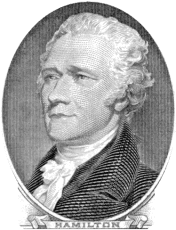
Several Federalist Papers speak of the Union's being more important than the several states. If Jefferson thought the state and federal governments were exactly equal, he was mistaken. Maybe he should've read the Constitution itself:
This Constitution, and the Laws of the United States which shall be made in Pursuance thereof...shall be the supreme Law of the Land; and the Judges in every State shall be bound thereby, any Thing in the Constitution or Laws of any State to the Contrary notwithstanding.
US Constitution, Article VI
Jefferson not a Constitutional scholar
In contrast to the Declaration of Independence, Jefferson had little to do with the Constitution. The Encyclopedia Americana confirms this: "Because of his absence in Europe, Jefferson had no direct part in the framing or ratification of the Constitution of the United States...." Unlike Jefferson, Hamilton and Madison signed the Constitution, and they wrote the Federalist Papers. They, not Jefferson, are the most authoritative voices on the Constitution's scope.
Page 1078, To Gideon Granger Monticello, Aug 13th, 1800:
...It can never be harmonious & solid, while so respectable a portion of its citizens support principles which go directly to a change of the federal constitution, to sink the state governments, consolidate them into one, and to monarchize that. Our country is too large to have all its affairs directed by a single government.
Again an opinion, and again no one's calling for the abolition of state governments.
And I do verily believe, that if the principle were to prevail, of a common law being in force in the U.S, (which principle possesses the general government at once of all the powers of the state governments, and reduces us to a single consolidated government, it would become the most corrupt government on the earth....
We don't have one common law that supersedes the power of state government, or reduces us to a single consolidated government, so this is irrelevant to determining the federal government's constitutionality.
I trust you will agree having read the above that Jefferson was an advocate of States rights, like I said in my earlier e-mails.
An advocate, yes. A fanatic like you libertarians who would denounce the federal government as unconstitutional, no. He wrote some of those letters 40 years after the Constitution's establishment, when the government's power was becoming plain. Nowhere in these quotes did he say "The present government is unconstitutional" or anything similar.
Along with his actions as president, there's evidence that Jefferson's strict-constructionist views softened as he grew older. From WWFFD? Who Cares? by Mark Kurlansky. In the LA Times, 7/4/06:
[T]he founding fathers, unlike the Americans of today, understood their own shortcomings. Thomas Jefferson warned against a slavish worship of their work, which he referred to as "sanctimonious reverence" for the Constitution. Jefferson believed in the ability of humans to grow wiser, of humankind to make progress, and he believed that the Constitution should be rewritten in every generation.
"Laws and institutions must go hand in hand with the progress of the human mind," Jefferson wrote in 1816. "As that becomes more developed, more enlightened, as new discoveries are made, new truths discovered and manners and opinions change, with the change of circumstance, institutions must advance also to keep pace with the times. We might as well require a man to wear still the coat which fitted him when a boy as civilized society to remain ever under the regimen of their barbarous ancestors."
It is surprising that these words are not more often quoted in Washington because they are literally carved in stone — on a wall of the Jefferson Memorial to be exact.
So let us stop worshiping the founding fathers and allow our minds to progress and try to build a nation of great new ideas. That is, after all, the intent of the founding fathers.
Hmm. Sounds like an explicit repudiation of the concept of original intent to me. Case closed?
Famous historian Joseph J. Ellis seems to agree. From What Would George Do? in the Washington Post, 12/23/07:
Because Jefferson was the prophet of the American promise, the author of those 55 words that begin "We hold these truths to be self-evident," he has always been a historical trophy that all sides seek to claim. For Franklin D. Roosevelt, Herbert Hoover, Ronald Reagan and Bill Clinton, Jefferson was the ultimate prize, the ace of spades in the American political deck.
This would have struck Jefferson as highly ironic, for he was on record as believing that each generation should be sovereign, not weighted down by what he called "the dead hand of the past." In that sense, Jefferson's greatest legacy was to oppose all legacies. He also made it clear that, once the United States became a thickly populated, urban, industrial nation, his agrarian vision became essentially irrelevant. That means that our political context for nearly 100 years has been resolutely post-Jeffersonian. Those folks claiming his mantle, such as those Supreme Court justices who declare their allegiance to the "original intentions" of the framers, are invariably imposing their own values and convictions under the cover of his name.
Founders supported government's evolution
But let's assume Jefferson did feel the evolving federal government violated the Constitution. Again I have to ask, so? Delve a little deeper into Founding Father history.
The presidents who served after Jefferson during his life were all Democrat-Republicans—members of Jefferson's own party. Madison and James Monroe were both Founding Fathers (I believe Monroe is considered one of the last). John Quincy Adams lived through the Revolution and was a president's son. We can safely assume these people were intimately familiar with the Founding Father's "original intent." A lot more familiar with it than you and I are, certainly.
Like Jefferson, other Founding Fathers lived during these administrations. Did they rise in protest against their own government? Against their own leaders—Madison, Monroe, and John Quincy Adams—who were Jefferson's heirs? I don't think so, and you haven't documented it if they did.
Madison was the "Father of the Constitution," so it's logically impossible for his view of the Constitution to be wrong. He and Hamilton defined the Constitution. So the government must've gone astray after Madison, if it did at all.
Monroe studied law under Thomas Jefferson and served in office under both Jefferson and Madison. He was perhaps the most popular president since Washington—so popular his first term earned its own nickname: The Era of Good Feeling. He came within one vote of being reelected unanimously in 1820.
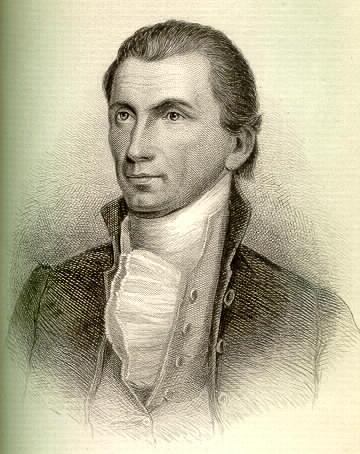
Again, where was the factionalism if Monroe was leading the government away from the Founders' original intent? Where were the protests from the remaining Founders (other than Jefferson)? How did Monroe get reelected almost unanimously if the Founders and their children, who knew the Founders' intent firsthand, opposed his actions?
The answer is clear to me, if it isn't to you. The Founders who believed in big government came to dominate the Founders who believed in small government. Jefferson's view was a minority view and it didn't prevail. Sorry to burst your bubble again, but two Founders—Madison and Monroe—were in control during Jefferson's remaining years. However they shaped the government, that was the Founders' intent.
If you want to argue against that, tell me the date when you think our federal government became unconstitutional. Make it within Jefferson's lifetime, or his views are irrelevant to your case. And tell me the politicians who led our federal government away from the "original intent" into unconstitutionality.
Be sure not to include Ben Franklin, Washington, John Adams, Jefferson, Hamilton, Madison, or Monroe, because they were all Founding Fathers. They can't have violated the Founders' original intent because they were the Founders. Their intent was the original intent.
I wish you good luck, because you're going to need it. I'd say my case is incontrovertible, but I'd love to see you try to disprove it. Go ahead...make my day.
Rob doesn't need more research...
If you really think that our federal government is even close to doing what it was intended by the founding fathers, I would suggest you might want to buy this book and read it as I did.
As I told you, I read a book of Jefferson's writings. It's titled The Political Writings of Thomas Jefferson and it sits proudly on my shelf. It may contain some or all of your quotes. It has stronger denunciations of the federal government than the ones you cited—for instance, Jefferson's "Declaration and Protest of the Commonwealth of Virginia" (1825).
As I said, I read this book in college, almost 25 years ago, so I don't need to start educating myself about what the Founding Fathers believed. You need to get moving if you're going to educate yourself as much as I have: 30 years's worth, if you go back to the eighth grade. I'm guessing you haven't studied the Constitution 30 years yet.
And I repeat that Jefferson isn't our foremost constitutional authority. He was one of many Founders who had a hand in the Constitution. He favored a weaker central government while others favored a stronger one. Their views were and are as valid as Jefferson's.
Jefferson helped Hamilton gain congressional consent to the assumption of state debts, for which the location of the federal capital on the Potomac was the political return. His growing objections to the Hamiltonian financial system were partly owing to his belief that the treasury was catering to commercial and financial groups, not agricultural, but he also believed that Hamilton was building up his own political power by creating ties of financial interest and was corrupting Congress. The issue between the two secretaries was sharply joined by 1791, when the Bank of the United States was established. They gave to the president their rival interpretations of the Constitution in this connection. The victory at the time and in the long run was with Hamilton's doctrine of liberal construction, or interpretation, of the Constitution and his assertion of broad national power. But Jefferson's general distrust of power and his reliance on basic law as a safeguard have enduring value.
Encyclopedia Americana
So Hamilton, a Founding Father much more involved in the Constitution than Jefferson was, won their internecine debate. "Hamilton's doctrine of liberal construction" triumphed because enough of the Founders, including Washington and Adams, supported it. Hamilton's doctrine was their original intent.
...but Matthew may
I suggest you study the Founding Fathers, plural, not just Jefferson. Start by (re)reading the Federalist Papers. If these Jeffersonian quotes are the best quotes you can find from the leading small-government proponent, you've failed to make your case. My case—that there were big-government and small-government proponents among the Founders—sits on much firmer ground.
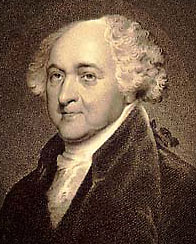
If you want to make your case, get back to me on what the majority of the Founding Fathers thought about their own government. Jefferson's opinion, as erudite as it was, was at the libertarian extreme of the political spectrum. If you think he represented all or even most of the Founders, you're sadly mistaken.
I also have several other books which I think would help you to understand that our current form of government is not even close to what some of the founding fathers intended
What "some" intended? What did the others intend? Americans accused John Adams, whose political writings I've also read, of being a monarchist. He may have been the polar opposite of Jefferson.
Yet he was a Founding Father as much as Washington, Jefferson, Hamilton, and Madison. According to his biographer, Pulitzer Prize-winning author and historian David McCullough, Adams crafted the Constitution of the Commonwealth of Massachusetts, the oldest democratic constitution still in use anywhere in the world. That document provided the framework for the US Constitution. Jefferson himself called Adams "the Colossus of Independence," McCullough said, adding, "If Jefferson was the pen to the Declaration of Independence, Adams was the voice" (LA Times, 6/4/01).
The obvious question is why you aren't citing Adams as well as Jefferson. Can you say "selective quoting"?
So again, the Founding Fathers weren't all libertarians and didn't all support a libertarian interpretation of government power. As proof, they emphatically rejected the more libertarian Articles of Confederation as too weak. An expansive view of the Constitution also derives from the Founding Fathers, so your claim that the present government is unconstitutional is false. End of story.
...that it is too big, too powerful and too corrupt.
It's too big, powerful, and corrupt in some cases because big organizations are inherently inefficient. That would explain why Al Gore led a commission to reduce government size, and why the Clinton Administration finally started paying down the national debt multiplied by Ronnie "Deficit Spending" Reagan. But being inefficient is far different from being unconstitutional.
The present government is constitutional because it derives from the original intent of Alexander Hamilton and the other Federalist founding fathers. END OF STORY.
Matthew gives up the ghost...
>> I don't see any point in continuing our e-mail correspondence. <<
Then don't continue it. Who's forcing you to?
>> You failed in trying to prove that Jefferson wasn't a states rights advocate, he was. <<
You failed to prove the point we were debating. Reread the original message title again: "Founding fathers = libertarian?" Since I never tried to prove Jefferson wasn't a states' rights advocate, except as a minor point in the actual debate, I don't particularly care whether I proved it or not.
What I care about is that I proved my thesis, the one you originally responded to. The Founding Fathers, plural, weren't libertarians. Since that was the point you said I should educate myself about, your claim stands refuted. You're the one who needs education if you think the Founding Fathers were entirely or mainly libertarians.
Again, in case you forgot, you implied the present government is unconstitutional or far from the Founders' original intent. Reread your own words: "If you really think that our federal government is even close to doing what it was intended by the founding fathers...." Jefferson's opinion on states' rights, when he had little or nothing to do with the Constitution, has little or nothing to do with your point.
In short, if you believe the present government is unconstitutional or far from the Founders' original intent, you failed to prove your claim. In contrast, I demolished it.
And let's note what I did say about Jefferson's states' rights position. From a book review of 1831 in the LA Times, 3/12/01:
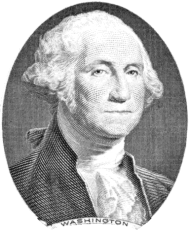
As the gap between proponents of states' rights and defenders of the Union grew wider, the aging James Madison, asked to clarify the intentions of his fellow Founding Fathers, came down unequivocally on the side of Union, denying the claims of states' rights advocates that they were acting in the tradition of Jefferson: That Jefferson "ever asserted a right in a single State to arrest the execution of an act of Congress is countenanced by nothing ever said or done by him," Madison declared.
So states have rights...but not enough rights to nullify acts of Congress, according to Jefferson's friend Madison. You and the present Supreme Court both may want to study the Founding Fathers' real intent. It may keep you from going off half-cocked.
...but not before wriggling
>> I never said that all the founders thought the same as you have said I did in several e-mails. <<
You never said differently. In fact, you referred to what "the founding fathers" intended as if they were a uniform group. As I showed you, Founding Fathers like Hamilton intended something far different from Founding Fathers like Jefferson. And Hamilton won their internecine debate.
If you meant to hold up Jefferson's opinions as the sole measure of constitutionality, I demolished your attempt. Who cares what Jefferson thought about the government's constitutionality when many other Founding Fathers, including those who proposed, wrote, and defended the Constitution, thought differently? Jefferson's opinion is irrelevant to what most Founding Fathers thought.
>> I am also not a libertarian as you have said several times, but I do agree with lots of things they say, but I also like several things from other forms of government. <<
You called yourself "libertarian minded" and said if it were up to you, Harry Browne would be president. Moreover, your claim that the present government is far from the Founders' intent is a classic libertarian belief. How you officially classify yourself is a detail compared to that.
>> I do not have a US vs THEM mentality, which I feel you have as well as most people on this planet. <<
Pretty funny since you, again, were the one who implied the present government is unconstitutional. How many times will I have to repeat this before you acknowledge it? Saying our leaders are acting unconstitutionally is tantamount to calling them immoral or unpatriotic, if not illegal. It's very clearly a divisive, "us vs. them" kind of claim.
>> We are all in this together. United we stand, divided we fall. So far I would say we have done a good job of falling. I want to work towards standing, although it may be too late. <<
You want to "work towards standing" how...by implying the present government is unconstitutional? You sound like a Tim McVeigh clone to me—like someone who wants nothing but to tear down our 225-year-old government. What's your solution for those who are violating the Constitution, in your opinion: a pat on the back?
Who exactly are you standing with if you call the present government "corrupt"? Are you planning to tell our president, senators and representatives, and judges that their efforts have corrupted our government, leading it far from the Founder's intent? I'm sure our leaders will really appreciate your positive, unifying message. No doubt they'll give you a medal for helping them see the light and admit their failures.
His-story or my-story?
>> If you think you know everything about the his-story of our country then you are not as smart as you think you are. <<
I know enough to prove my claim that the Founding Fathers weren't libertarian and to refute your claim that the present government is far from what they intended. Since you apparently don't know as much as I do on the subject, you may want to hit the books.
>> His-story is just that, and it depends on whose story you belief. <<
I'll go with Hamilton's and Madison's story, since I cited and quoted them in my reply. Hamilton's Federalist supporters would say the present government derives directly from their interpretation of the Constitution.
>> All you have to do it watch some of the latest programs on the history channel (among others) to find out that the True his-story usually is not told or found out until a later time. <<
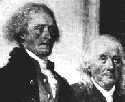
All you have to do is quote some of the history you supposedly learned on TV and you won't lose the next debate so badly.
>> One of my points is that the present government is too big, too powerful and too corrupt. There is nothing that you can say which will change my mind on that. I KNOW it is a fact. <<
I understand. That's a different point from the present government's being unconstitutional. As I already stated and showed.
>> I appreciate the time and effort you have put into corresponding with me, and wish I could have taken more time to respond in detail on many points, but I don't feel it will serve me to spend any more time with you. <<
Since you don't seem to recall what you claimed, which is what I debated, you're probably right. Judging by what I've seen, you can't begin to support your unsupportable claims about our present government's constitutionality.
>> I can't and don't need to change your mind, and you can't change mine. <<
Yes, don't let the facts change your mind. I cited a dozen or more of them and you didn't respond to even one. Score this exchange Rob 1, Matt 0.
Better luck next time you debate someone, friend. You were out of your league this time 'round. I suggest you tackle people who know less American history than you do, not more.
Why this is relevant?
Some people may wonder what this debate has to do with multicultural comics featuring Native Americans. A lot, indirectly. This debate is basically where the culture wars that divide America began. The Founding Fathers were fundamentally and irreconcilably split; counting Negroes as 3/5 of a person shows how awkwardly they compromised their incompatible views.
These debates and divisions have continued to this day. The reactionaries, false patriots, and gun nuts would like to impose their bastardized version of America on the rest of us. As that conservative paragon Tim McVeigh wrote, "Obey the Constitution of the United States and we won't shoot you."
The basic question is whose vision of America is going to rule? Will it be that of elite white males like Ronald Reagan, Pat Buchanan, and Dubya Bush? Or will it be the rest of us in all our multicultural splendor?
Rob
Related links
Forgotten Founders (by Bruce E. Johansen)
Are taxes "theft"?
Libertarianism = anarchy
Fun 4th of July facts
Right-wing extremists: the enemy within
Readers respond
"[T]he very suggestion that a Government of Law is subject to interpretation is incredibly STUPID...."
|
. . . |

|
All material © copyright its original owners, except where noted.
Original text and pictures © copyright 2007 by Robert Schmidt.
Copyrighted material is posted under the Fair Use provision of the Copyright Act,
which allows copying for nonprofit educational uses including criticism and commentary.
Comments sent to the publisher become the property of Blue Corn Comics
and may be used in other postings without permission.